This post was contributed by Bronwen Maseman, a Madison-based librarian, educator, consultant, and researcher. This case study is part of the Community Archiving Workshop Regional Training of Trainers program, funded by an Institute of Museum and Library Services (IMLS) Laura Bush 21st Century Librarian Program grant (RE-85-18-0039-18) in partnership with the Association of Moving Image Archivists.
The Archives and the Collection
The Special Collections and Archives at the University of Wisconsin-Eau Claire collects the official and unofficial records of this regional university in west-central Wisconsin. Housed in UW-Eau Claire’s McIntyre library, the archives document the history of the University from its roots as a Normal School focused on teacher education to its present status as a thriving institution with more than 10,000 undergraduates and several vibrant graduate-level programs.
The Archives also serves as an Area Research Center for the Wisconsin Historical Society, giving it an important role as a repository for manuscript collections and government records. As an ARC, it provides access to materials related to the history of six Wisconsin counties: Buffalo, Chippewa, Clark, Eau Claire, Rusk and Taylor. The Archives are also a hub for local history research within the region and provide access to local history publications and other resources.
Meeting the Collection Challenge
Greg Kocken, the Head of Special Collections and Archives, and Crystal Schmidt, a Cataloger in Technical Services and Special Collections, saw a need at UW-Eau Claire for greater understanding of audiovisual preservation issues. In particular, they knew that the Archives collection contained materials that were not being used to their full potential due to preservation risks and lack of knowledge. They decided to participate in the Community Archiving Workshop Training the Trainers event held at UW-Madison in June 2019.
The team’s short-term goal was to use the knowledge gained from the CAW Training of Trainers workshop to ensure preservation of Archives Series 177. This series, consisting of 22 boxes of reel-to-reel audio tapes and cassettes, had been sitting in McIntyre Library’s climate-controlled storage area for decades. The minimal finding aid for the Series indicated that the tapes and cassettes consisted of recordings of campus speakers, events and presentations dating back to the early 1960s. While some names of notable speakers were listed on the finding aid, most of the content remained unknown. But before delving more deeply into the content, the team knew they had to learn more about the preservation status of the materials.
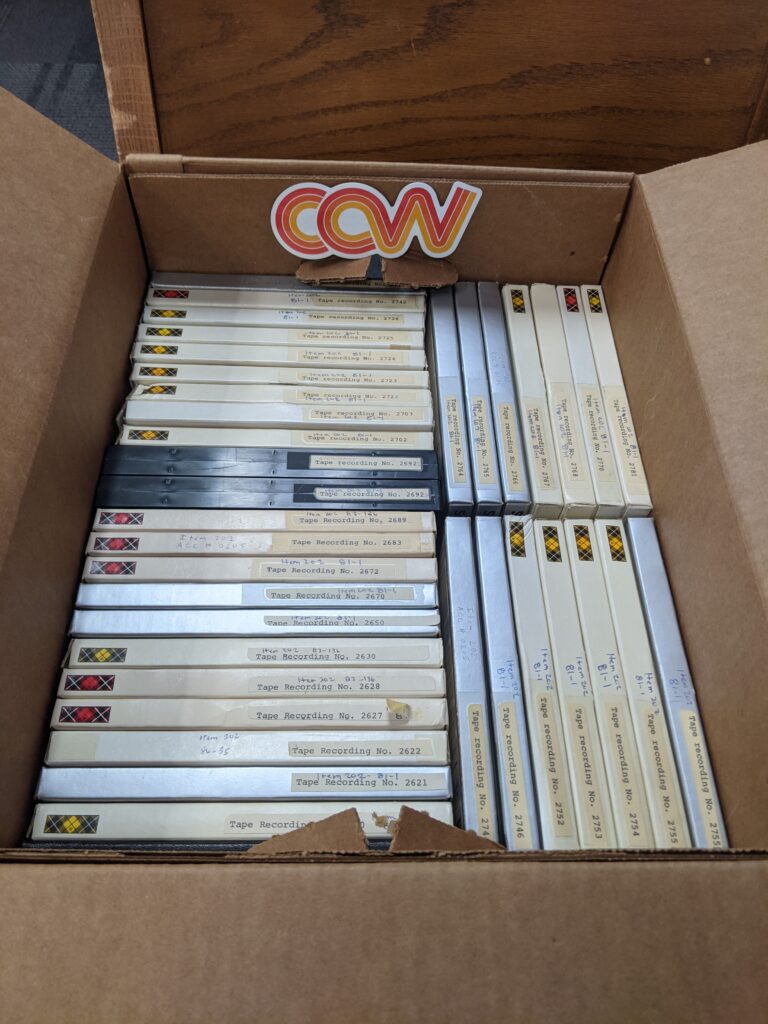
Spotlight: Preservation Challenges for Open-Reel Audio
While playing back audio cassettes is still fairly straightforward, it is more difficult to assess the condition of open reel audio tapes, a large format of audio recording that had its heyday in the 1960s. Crystal and Greg were able to source a Lyrec FRED reel-to-reel player to assist them in assessing the open reel collection items. They later upgraded to an Otari machine.
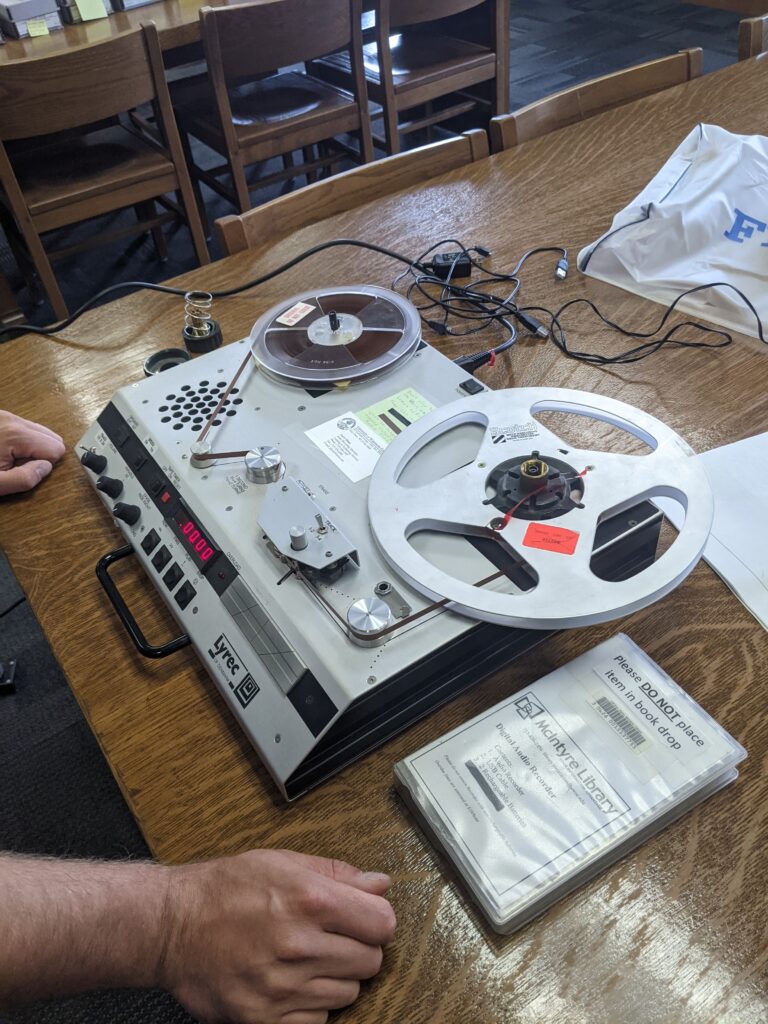
Many of the preservation risks associated with open-reel tape are similar to those encountered with compact audiocassettes. When assessing the collection, Greg and Crystal were looking for:
Dust, dirt, and mold: Because the tape in an open-reel recording is not protected by a cassette, the reels are at greater risk of damage from materials in the air such as dust, dirt and mold. It’s important to make sure open-reel tapes are always stored upright in high-quality boxes that keep out contaminants.
Vinegar smell: As the acetate tape used in open-reel audio recordings degrades, it gives off the smell of acetic acid, or vinegar. The team therefore used their noses, as well as their eyes, when examining Series 177.
Bad winding and other tape damage: In order for open-reel audio to maintain optimal condition, it’s important to ensure that the tape is wound with no gaps or twists. Open-reel tapes have leaders, or sections of non-recorded tape at the beginning and end of each reel which serve to protect the recorded sections. Since the leaders tend to take the brunt of damage during playback, it’s important to make sure they are long enough and in good condition.
The team checked for gaps in the wound tape and checked overall tape condition, wrinkling and other damage. Greg taught team members how to splice damaged audio tape in order to repair damage from bad winding.
Meeting the Covid Challenge
Like other CAW Training of Trainers participants, the UW-Eau Claire team had originally planned to host a workshop that would be open to the wider public working in collaboration with archives staff. However, the beginning of the Covid pandemic in March 2020 put a stop to that approach.
Instead, UW-EC decided to host an in-house workshop aimed only at Special Collections staff. Greg and Crystal were joined by Seth Vircks, the Assistant Records Manager at UW-Eau Claire, and his son Brice, a student worker in Special Collections and Archives. Although the workforce was more limited than they had planned, their workshop still maintained the focused enthusiasm and can-do spirit of other CAW events.
Greg kicked off the event on June 23rd, 2020 by playing a recording of Henry Kissinger’s University Forum speech in order to demonstrate how to use the reel-to-reel audio player the team had borrowed from Learning and Technology Services. Impressed by the recording’s good condition and audio quality, the team members were hopeful that the rest of the collection would contain some other treasures.
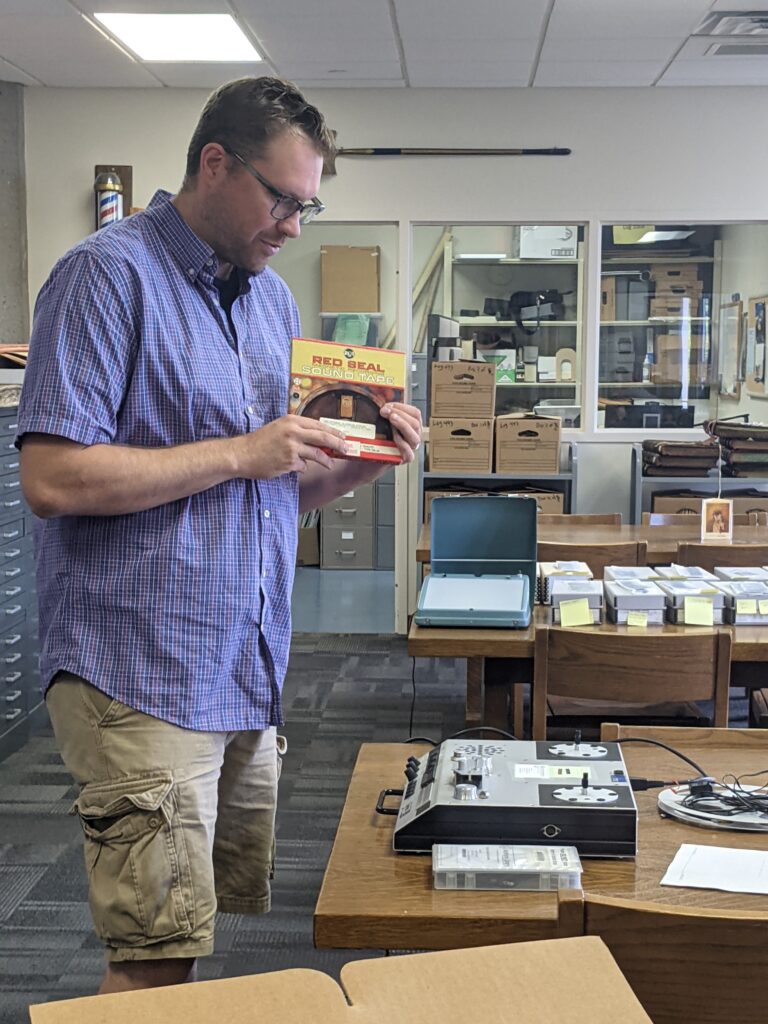
Using an adapted version of the CAW Inventory Template and Instructions Greg, Crystal, Seth and Brice proceeded through the painstaking process of examining Series 177. Recording their results in a shared Excel spreadsheet, the team assessed and noted the following:
- Recording number, title, author, date, and associated event (if known)
- Format (reel-to reel or cassette), tape brand (Scotch, RCA, Ampex, etc), tape size.
- Recording speed (in ips), number of recorded sides; tracks
- Sound type (mono, stereo), and length of recording
- Preservation issues: dust, dirt, mold, vinegar smells, bad wind, and/or wrinkling
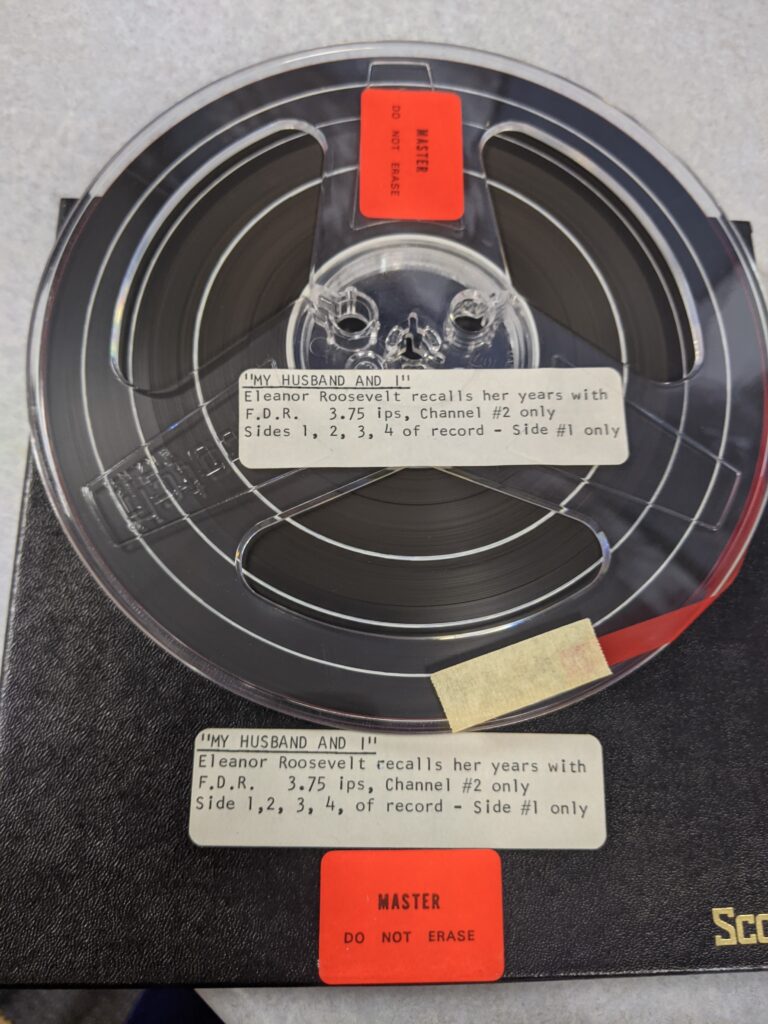
Moving Forward
Although their Community Archiving Workshop looked different than they had anticipated, Greg Kocken and Crystal Schmidt were still satisfied with the process and outcome. Participants were happy to discover some gems hidden in the collection, such as a 3-tape recording of an American Indian Movement Forum held on the UW-Eau Claire campus April 24, 1974. All participants learned new skills that they can apply to other projects and pass on to colleagues.
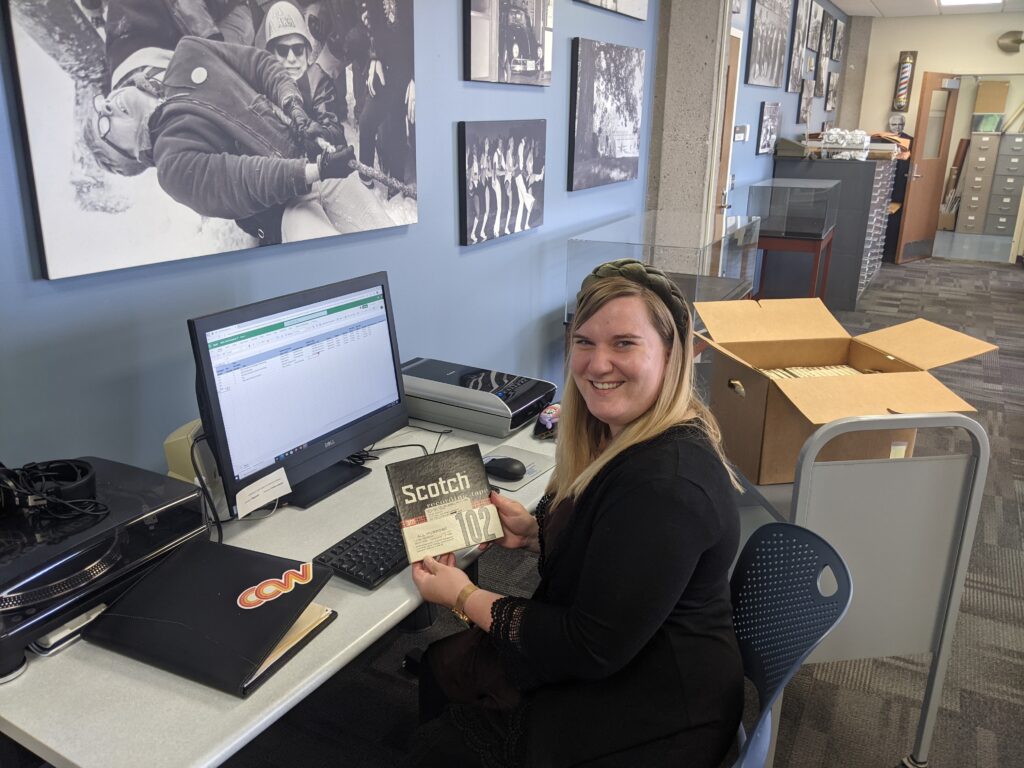
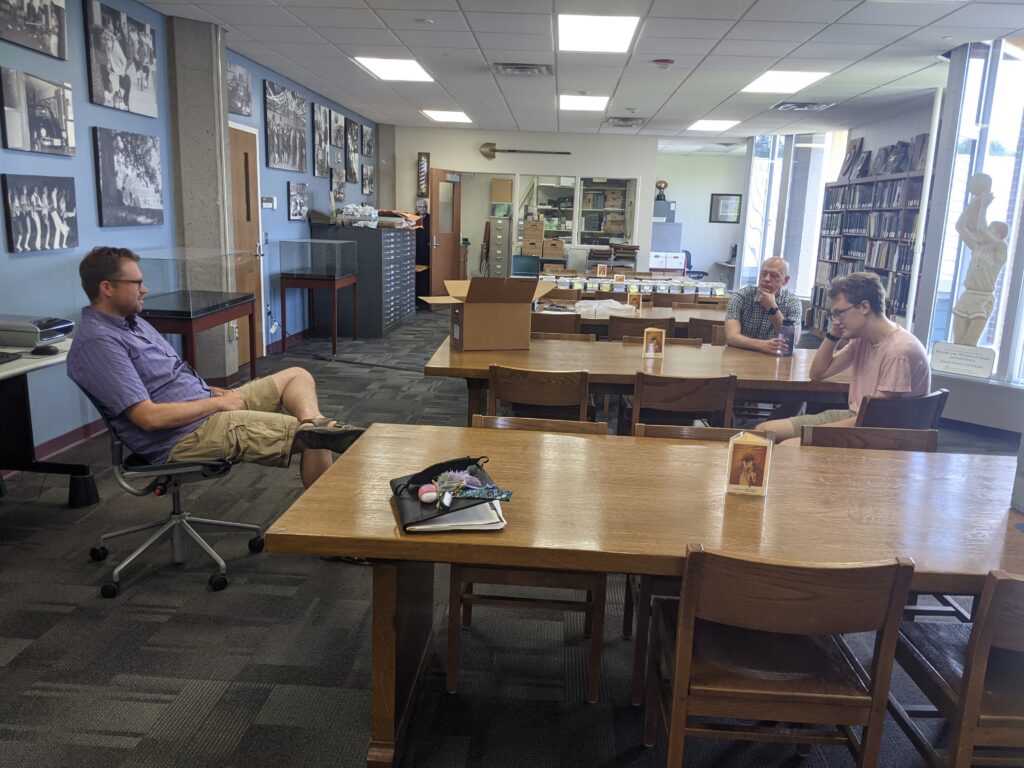
Most importantly, perhaps, the team gained momentum that led them to immediately begin the process of digitizing a selection of the items in Series 177. In Summer 2021, they completed the digitization of the highest priority items from Archives Series 177 (a total of 173 open reels), including that 1974 AIM open forum. The team upgraded from the FRED to an Otari machine borrowed from the Music Department which enabled them to produce a higher quality result. Even during a pandemic, working as a team helped the UW Eau Claire Archives and Special Collections move forward.

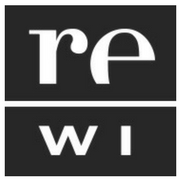
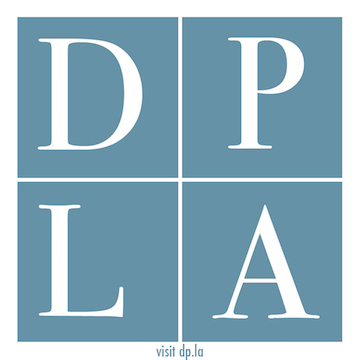
You must be logged in to post a comment.